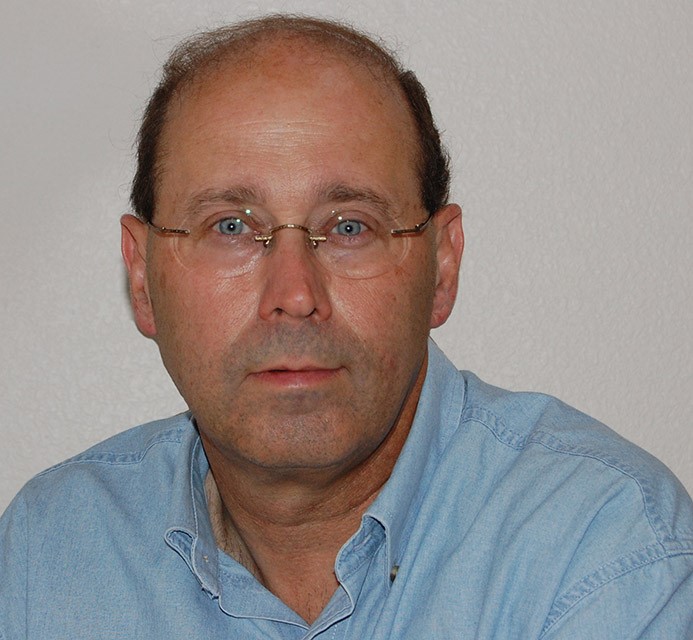Physics
Alumnus Spotlights — Timothy Howard

Featuring Alumni from the University of Memphis
Department of Physics and Materials Science
Timothy Howard is a physicist with B.S. and M.S. degrees from the University of Memphis (UofM). After leaving UofM in 1979, he spent 30 years working in the aerospace industry, with a brief detour to work on the LIGO project for gravitational-wave detection at the California Institute of Technology. After early retirement from the Boeing Company in 2010, where he was an Associate Technical Fellow, he embarked on a teaching career at the University of New Mexico, where he is an adjunct lecturer in Physics and Astronomy. His past and present work includes the development of systems for guidance and navigation, active laser sensing, space-based imaging and remote sensing, astrophysical missions, and networks of unmanned aerospace systems. His current research interests include the development of microsatellite optical payloads and applications of quantum sensing to aerospace technology. He holds two U.S. patents for laser gyroscope technology and is a Fellow of the NASA Institute for Advanced Concepts and an Associate Fellow of the American Institute of Aeronautics and Astronautics, where he is also a member (and former Chair) of the Sensor Systems and Information Fusion Technical Committee.
In what follows, Mr. Timothy Howard describes the development of his interest in science and technology, and how it led him to pursue degrees in physics at the UofM. From these experiences, he also offers encouraging and timely advice to students currently studying physics as well as to those considering or aspiring further studies and careers in physics.
I first became interested in science and technology as a young boy, after my mother sat me down in front of the television to watch one of the first Mercury program launches. I knew right away that I somehow had to be involved in this, and my interests in science and math grew over time and extended broadly to all of the sciences as well as computers, electronics, and technology in general. I got my first telescope at about age 10 and also had a chemistry set, a rock collection, a camera, and was usually first in line to sign up for the local Science Fair. But I really became aware of Physics when I attended a high school workshop and spoke to a local university physicist. I explained that I was really interested in astronomy and spaceflight, and he advised me to go get a degree in Physics and branch out from there. It was good advice. So when I started preparing for college I knew my major would probably be chemistry or physics. I tried a year as a chem major, then a year in physics. Physics really grabbed my attention because of its breadth, so I settled into the Physics track and never looked back.
As an undergrad in physics, I found the curriculum to be demanding in the amount of work required, but also rewarding in the linkages between Physics and so many other disciplines. There was always something fascinating to learn and I could see how fundamental Physics was to all of the areas that we now refer to as STEM. Moreover, at UofM I found that the atmosphere in the Department was truly collegial, even for the undergrad students. I felt that I could approach any of the faculty at any time for help or advice, or even just a chat about current developments. This formed a bond that led to my moving into the graduate program after I got my bachelor’s degree.
As I approached my graduation with an M.S., I began to think about Ph.D. study somewhere, but I also noticed that the aerospace industry was ramping up its hiring of new graduates. I decided to try working in industry for a while, and found it so interesting that I never returned for that doctoral degree. Along the way I’ve had a chance to work alongside engineers, mathematicians, computer scientists and other professionals. I have always found that my Physics background enabled me to cross interdisciplinary boundaries easily. I’ve often been called upon to work on technically difficult projects, and my training in physics has really paid off.
For those who may be thinking about majoring in physics, or are perhaps already in the program, one thing I can say is that it is indeed a springboard from which you can head in many different directions. I found it the perfect preparation for my career, but today there are more even potential areas where you can apply your physics skills. One area that may be of timely interest is the emergence of quantum-based technologies — quantum computing, quantum communications, and quantum sensing. Physics is the perfect background here. But there are many other technologies including energy, advanced materials, AI, data science, the health sciences, and study and protection of Earth’s environment, where physics is a good background.
Is physics hard? You bet. But if it is something you want to study, stick with it. All of us who have studied physics have struggled with it at times. Just press on. And, you’ll be surprised, probably, at where you can find help. Talk with your fellow students, and join the physics club (SPS). Attend as many seminars and guest lectures as you can. Chat with your professors, not just about that homework that’s due, but ask them how they got involved in physics. You’ll find that people in the field are surprisingly open and welcoming, a true community.
Once you graduate, stay involved. Join a professional society and stay involved with it. Keep up your skills by taking after-hours courses or short courses and seminars. Write a paper or volunteer to be an officer in a local group. These are things I have done and I think they’ve helped me immensely.
